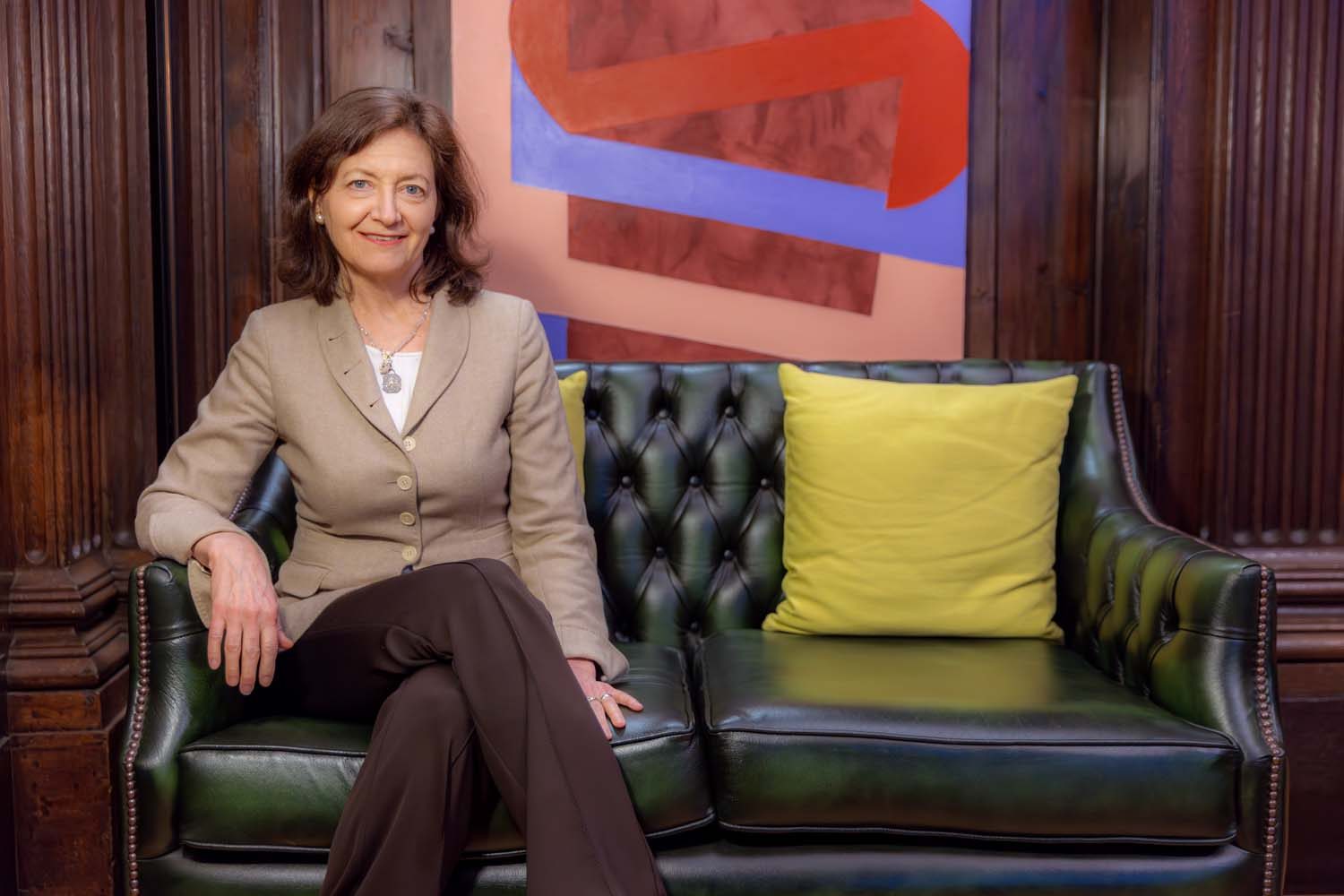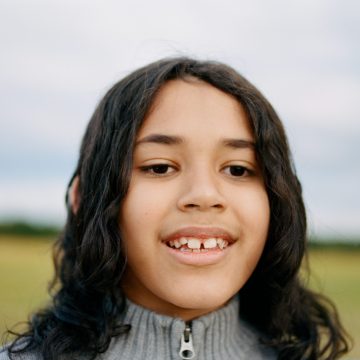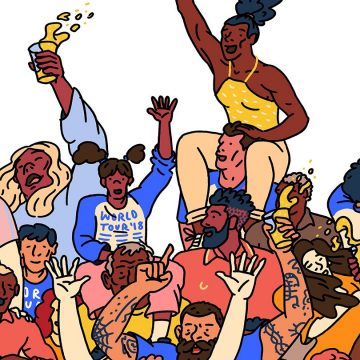VC: year one
From California to Cambridge: Vice-Chancellor Professor Debbie Prentice wants to use her fascination with the way humans interact to help her establish a common mission.
It doesn’t happen by luck, and it doesn’t happen by magic. So, the question is: just how do you become Cambridge’s Vice-Chancellor? “That’s exactly what the King asked me!” says Professor Debbie Prentice, who became Cambridge’s 347th VC last July. “Well, I told him that it’s a job that you apply for in the usual way. Yes, it draws on a lot of different skills and there are a great many ways to do it, but it is just a job – albeit, as previous VCs have told me, the best job in the world.”
A fifth-generation Californian, Professor Prentice spent her early years in Los Angeles while her father was writing music for television and her mother, who pretty much raised her single-handedly, worked in insurance. She attended state schools and spent much of her time playing the piano for fun – and sometimes for money – but didn’t have a strong sense of exactly what she wanted to do next, just that it would be something scientific.
“I was interested in science and maths broadly. I found my way into biology because I loved the systems-thinking, but then I discovered psychology – by ‘accident’ – and realised that you could apply the methods and the thinking of a natural science like biology to understanding how people behaved in the social world.”
“We were about enabling people to drink at the level where they felt comfortable.”
After a biology and music degree at Stanford, and further study at Yale, she joined the Department of Psychology at Princeton, and began to explore in earnest her fascination with the ways that humans represent themselves. “It was the first time in my life that I had ever been in an environment that functioned like the social groups I had studied in my psychology classes; the conformity pressures that exist and the ways in which people get their identity from the groups of which they’re a part.”
And then, one of her senior students, Jenifer Leightdale, started talking about her experiences at “eating clubs” – the Princeton equivalent of Cambridge dining societies – and the mainstay of student social life at that time. “Jenifer described the drinking culture at Princeton, which involved heavy drinking, especially on Thursday and Saturday nights – not Fridays because there were sporting events on Saturday morning, so everybody had to abstain on Friday nights. But Thursday and Saturday nights were the big nights.

“She told me that everyone was having a great time and was fine with it, but that it was worrisome to her. I asked: ‘How do you know everyone else is fine with it?’ – and of course she wasn’t sure. It seemed to me that what she was describing was ‘pluralistic ignorance’ – where your belief that everybody else is comfortable with a certain behaviour leads you to act like you are comfortable with it too, even though you’re not. Your private reality and your public reality are in conflict – a situation that each individual believes is unique to them but is in fact shared by everyone in the group.”
Professor Prentice wanted to know more – and so she launched a research project examining pluralistic ignorance in the context of alcohol use on campus. She would go on to be among a very early group of researchers who were able to identify that alcohol abuse among college students is very often not a medical or a clinical problem, but rather, a social problem.
Professor Prentice was able to use her findings to impact student behaviour, designing an intervention where students were exposed to the idea that ‘it wasn’t just them’ – in fact everyone was engaging in heavy drinking to fit in socially. “You give them a chance to discuss with the group: ‘Why do we all think this?’ And that intervention lessened the pressure they felt to drink in order to fit in. The result was an overall reduction in drinking. It doesn’t eliminate drinking, but we were never about eliminating drinking. We were about enabling people to drink at the level where they felt comfortable. And that’s in fact what we showed in our work.”
You understand the parts by understanding the ways in which they interact with each other. I’ve always thought about human beings in their social worlds that way – as an ecosystem
Of course, students are not the only groups to study at universities. But she is nonetheless amused by the suggestion that her interest in groups, social norms and co-operation led her to university administration. “I’ve always thought about human beings in their social worlds that way – as an ecosystem. You can’t understand a part of it without understanding the rest. So, it’s true, I wanted to find out: how do we make this place better? How can we do this project better? In time, I was promoted to department head, and things led to things.” Those things included chairing Princeton’s Department of Psychology, serving as Dean of Faculty for three years and Provost for six – and now, of course, Cambridge’s first ever American-born Vice-Chancellor.
Nowhere is the impact of social systems more relevant than in the discussion about how we safeguard debate and free speech in education. Does she think it has got worse? And how does she think universities should tackle the issue? “There are many things that lead people to self-censor, and I think that the challenges around not knowing who you’re talking to and not knowing if what you have to say is going to get a positive reception lead people to hesitate to express themselves. It’s become very difficult to have the kinds of authentic sharing of views that many of us remember from our own college days. So, one of my initial projects here at Cambridge is to look for ways to create spaces to give people experience listening to diverse views, expressing diverse views.”
Initially that has included launching the Vice-Chancellor’s Dialogues, which will cover some of the most difficult issues of our time, such as last November’s discussion on assisted dying. “The rules were: we love debate, but this is not a debate. This is a dialogue. There were times when you could see some of the speakers wanted to score points, but the ethos and the environment discouraged that. And what was interesting was how, over time, the participants intuitively started to seek common ground. Human beings are inclined to agree. And even if they’re facing somebody very different from them who has different views, they’ll think harder. They’ll try to find those places where there are points of agreement, and then they’ll try to figure out what they’re disagreeing on.”
So, is it part of a university’s role to expose students to different views? “It’s about equipping students to know their own limits,” she says. “Because nobody has to come to these dialogues. Free speech: again – it’s supposed to be free. It’s about relaxing your defences and opening your mind. There are times and issues where it’s just not going to happen, and we need to respect that. That’s just human nature, as well. The job is to enable students to experience an environment where people can disagree, to learn where their limits are, and how to stretch beyond those.”
“A university is like a small city: it depends on the people who keep the place running.”
The free speech discussion is, of course, just one of many around what universities are ‘for’. Should they focus more on preparing students for specific roles? “Students do learn skills here, but the critical thing is that they learn how to think, and that we help cultivate their curiosity, confidence, resilience and flexibility,” Professor Prentice says. “Because job market skills they can use when they are 21 are not necessarily going to be at all useful to them when they are 25, much less when they’re 35 or 85.
“That’s why I always tell students, study whatever you’re passionate about. You’ll be able to go deeper, think harder, and hone whatever those skills are – and believe me, the skills can be repurposed. Give it your whole self, and your whole mind is going to take you further. That’s our job, right? To just let them throw their whole selves at it. The more absorbing it is for them, the more they’re going to get out of it.”
What else is on her to-do list? A university, she says, is like a small city: it depends on the people who keep the place running. Professor Prentice thrives on getting these systems working together more efficiently. “It’s hard getting everyone to understand that what they are doing is part of a common mission. It’s not because anyone disrespects anyone else. It’s because it’s just difficult! We’re all speaking the same language, but we don’t always have the same thing in mind. And I’ve got a huge amount of experience dealing with that.”







